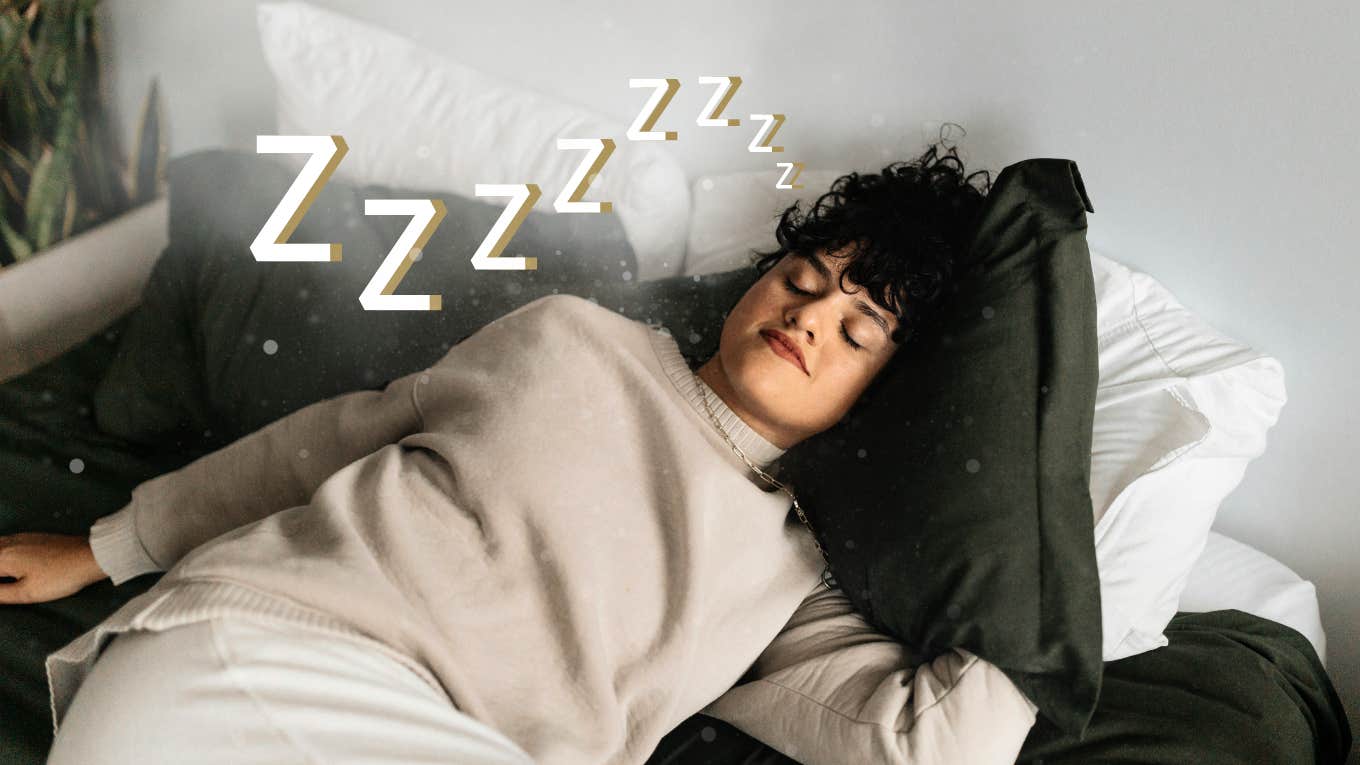8 Tiny Habits That Will Make You A Better Sleeper Than 98% Of People
How to get the sleep you deserve.
 Ivana Cajina | Unsplash+
Ivana Cajina | Unsplash+ Sleep is not only good for your health, but also your happiness, so knowing how to sleep better — especially when you've been struggling with it — is vital.
If you're not sleeping right or relying on sleep aids when you haven't eliminated other factors that could be negatively impacting your sleep, then you're going to feel tired, and groggy, and may have a host of other health issues.
It's time to stop asking yourself, "Why can't I sleep?" or wondering why you stay up at night with insomnia and instead look for helpful tips for better sleep. Once you figure out how to sleep better, you'll never need to rely on anything but your own body!
After all, sleep is a great barometer as to how everything else is going for you. I have yet to hear someone come in with mental health problems and not talk about how terrible their sleep is.
Worse yet, most people suffering from sleep problems end up getting a prescription or over-the-counter sleep aid or using other drugs and alcohol to help them. These might help you sleep, but there's no guarantee you're getting the restorative sleep your body needs.
Sleep habits are also called "sleep hygiene." It’s a weird term, but one that is used to describe the habits you have around sleep.
Many people are guilty of a couple of bad sleep habits, like falling asleep with the TV still on.
Some of the real culprits of bad sleep habits, however, are in your own body. The first is a neurotransmitter imbalance.
Your neurotransmitter levels dictate some of your sleep patterns, like creating melatonin. This is usually indicated if you have trouble falling asleep.
- If you have issues "shutting down" your brain at night, then you may have issues with dopamine, adrenaline, or GABA production as well.
- If you have trouble staying asleep, you might consider a couple of things, like magnesium. Magnesium is a natural relaxer and might help you stay asleep.
- If you find yourself suddenly awake, it could also be a blood sugar imbalance. Try having a protein snack before bed or a light protein snack if you wake up.
Let’s say that you have tried the above and your sleep is still lacking and you don’t feel rested. Now it’s time to look at other factors to improve your sleep.
Here are 3 things you must avoid at all costs when you're trying to get a good night's sleep:
1. Caffeine
You probably know that caffeine is a stimulant. But you might be caught in the cycle of “I’m so tired in the afternoon that I have to drink it." You may also believe caffeine doesn't affect your sleep, but that's not true.
 Photo: Lood Goosen/Pexels
Photo: Lood Goosen/Pexels
Caffeine can stay in your system for a long time, and even having caffeine six hours before bed can disrupt your body's natural timing.
Additionally, caffeine impacts your adrenal glands. If you reach for caffeine upon waking, your adrenals (which produce cortisol) become sluggish over time. So, if nothing else, wait on the caffeine (about two hours) after you wake up to allow those adrenals to get going first.
Or, if sleep is a huge problem for you, eliminate it for a while and see what happens.
2. Alcohol
Many people grab alcohol at the end of a busy day to help them relax and potentially fall asleep. However, while alcohol can help you fall asleep, it also impairs REM and makes you wake back up again.
The more you drink, the more pronounced these effects are. Another effect of alcohol is reactive hypoglycemia, aka low blood sugar. Essentially, alcohol will cause your blood sugar to fall and wake you up because your adrenaline starts pumping ... Not to mention making you run to the bathroom to get rid of excess fluid.
3. Carbohydrate or sugar-heavy foods
Making sure that your blood sugar is stabilized before bed is a great way to have a good night’s sleep.
If you eat sugar or drink alcohol before bed, you'll experience a spike and then a dive in blood sugar. Then, your adrenaline will kick in and wake you up.
How do you combat hypoglycemia? Make sure your blood sugars are stabilized. Instead of reaching for a salty, carby, or sugary snack before bed, reach for some protein.
If you wake up in the middle of the night, try a small protein snack or talk to your doctor about taking l-glutamine supplements, which are synthetic amino acids to help you get better rest.
Here are 8 tiny habits that will make you a better sleeper than most:
1. Declutter your bedroom and make it a sleep haven
Is your room a place of solitude? Or a catch-all for everything? Is it a relaxing place, or is it chaotic or even stressful? Start here.
Do your clothes have a "home?" Are your shoes everywhere? Straighten out your environment. Put clothes where they belong, tuck your shoes away, and turn your bedroom into a haven for sleep.
There should only be two activities that you do in your bedroom … get sleep and be intimate. If you're doing more than those two things, then you need to do some evaluation here.
2. Make your bed as comfortable as possible for you
Your bed is key to good sleep. Many people choose to sleep on a couch or recliner because their beds are so uncomfortable, but they don’t consider getting a new mattress.
Can’t afford a new mattress? Get a memory foam mattress topper (not just one of those egg crate toppers either). Once I got a memory foam mattress, my nights changed forever. I used to wake up stiff with a terrible backache. No more!
Your bedding is another area of consideration. You don’t need fifteen sheet sets. All you need is to splurge on one super comfy set of sheets you can wash and reuse. In addition to that, think about blankets.
I love super soft blankets and keep about six on my bed. It’s kind of like layers of winter clothes. I can pull up covers or take them off, depending on how hot or cold I am.
Finally, don’t forget about the pillows! If you can’t change anything else, change your pillow. There is a difference between a $5 pillow and a $75 pillow. I swore I would never spend that much on one until I did, and that was a game-changer! My pillow keeps its shape and I keep my comfort all night.
3. Make your bedroom as dark as you can
Shut all of your lights off and take a look around the room. What lights do you see? Maybe the phone charger lights up, or the cable box light is lit.
Blue light suppresses the production of the sleep hormone melatonin more than any other light source. Green lights aren’t much better and suppress melatonin about half as much as blue lights.
So, it is very important to eliminate as much light as possible in your bedroom. These can come from phones, night lights, TVs, computers, or even bright lights outside your windows.
4. Stop using telephones or TVs before bed
All screens interrupt your natural circadian rhythm, aka your sleep-wake cycle. They also interfere with serotonin production, which means less melatonin.
Additionally, using technology or TV while in bed causes you to go to bed later and keeps your brain from shutting down (due to stimulation).
Cut tech time and TV off one to two hours before bedtime to improve your sleep quality.
5. Eliminate noise or sounds in your room
Noise can disrupt your sleep, particularly during certain sleep phases, most significantly during the "beginning" sleep phase.
Noise can also impact your REM sleep, prevent you from falling asleep, and can wake up after you've finally gone to bed.
Take a minute to lay in bed with everything off. What do you hear? Perhaps a ticking clock, the dog making sounds, TV (even in the other room), and potentially your partner snoring.
Try and eliminate the sounds that you can, or even use essential oils to help with your partner's snoring. For anything else, you can use a sleep conditioner, like white noise or a fan.
6. Make sure your bedroom is cool at night
You're more likely to sleep easier in a cooler environment. Finding a cooler environment is a personal decision. I like to sleep with the house temperature at 62-64 degrees. I layer up my blankets so I can adjust hotter or cooler much easier.
My hubby likes a hot sleep environment (but then complains when he wakes up in a sweat) so we do have a heated mattress pad that we can regulate different temperatures on each side of the bed.
7. Discover a bedtime routine for yourself
Since my kids were little, we instilled a good bedtime routine so their little bodies knew when it was time to begin to wind down and fall asleep. The routine was essentially a bath, book, and bed.
If you think about some of the bedtime routines you have around sleep, you can easily pair new routines with the old ones.
For instance, if you brush your teeth before bed, take a magnesium supplement at the same time, or plug your phone in and don’t look at it for the night. If you put your phone and technology away, take this time to reconnect with your family.
Finally, don’t exercise too close to bedtime. You won’t be able to turn your adrenaline down enough to get you to sleep.
Keep a consistent bedtime and wake-up time, even on the weekends. I know the bedtime during the week isn’t as challenging as on the weekends. Your body doesn't know the difference between Wednesday and Saturday, so give a consistent sleep-wake pattern a try.
8. Try supplements or essential oils to help you relax
I never advise taking an over-the-counter sleep aid or a prescription aid. They're often addictive and you might have trouble sleeping without them.
Some natural remedies to try are:
- Essential oils diffused bedside
- Epsom salt baths or foot soaks
- Magnesium supplementation
- A supplement that is designed for natural sleep
- Consider GABA if you have trouble turning off your brain
- Consider l-Theanine or taurine as well
Dr. Teralyn Sell, Ph.D., is a mental health coach who focuses on helping people with anxiety, and sleep problems. She has been featured in MSN, ABC, Forbes, Woman's Day, Healthline, and more.
